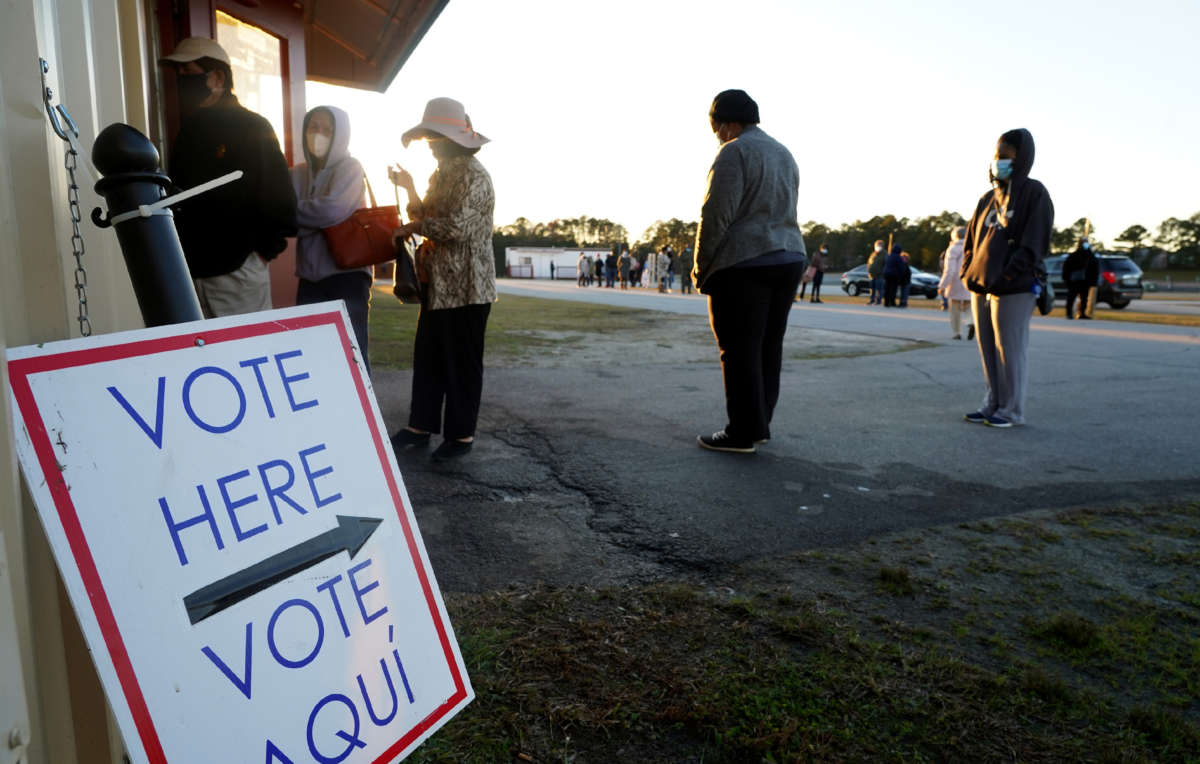Did you know that Truthout is a nonprofit and independently funded by readers like you? If you value what we do, please support our work with a donation.
As in-person voting begins for two Georgia senatorial runoff races, a surprising statistic has emerged: more people voted on the first day of in-person voting this week than on the first day of in-person voting for the general election earlier this year.
More than 168,000 Georgia voters came out to cast ballots at designated voting locations on Monday. That number surpasses in-person voting that took place on October 12, when 126,000 voted ahead of the general election races last month.
The latest numbers from the U.S. Elections Project as of Wednesday morning also demonstrate an upswing in absentee ballot requests, with more than 1.6 million Georgia voters asking to vote by mail. Of those mail-in ballots, more than 379,000 (over 1-in-5 that have been sent out so far) have already been returned.
More ballot requests are likely to come about, as Georgia residents have until January 1 to ask for them, ahead of the January 5 runoff elections. For comparison, the general election saw 1.78 million absentee ballots requested in total.
The runoff races that voters are casting ballots for are important, as they will determine which political party will control the Senate in the upcoming congressional term. Incumbent Republican Senators Kelly Loeffler and David Perdue are squaring off against Democratic challengers Raphael Warnock and Jon Ossoff, respectively. If Democrats win both races, then Senate control will go to that party; Republicans only need to win one of the two races to ensure they retain power in the “upper chamber” of Congress.
In spite of the higher numbers for in-person voting seen so far, most election experts don’t expect the race to see the same turnout that was observed in the general election. Runoff races in Georgia typically see a significant drop in turnout compared to how many vote in their respective general elections. In 2018, for example, the runoff race for Georgia secretary of state saw a 62 percent drop from the number who voted in the general election in November of that year.
But given the importance of this runoff Senate race, experts are predicting a higher-than-normal turnout rate from runoffs in past years. Some are of the opinion that as many as 4 million ballots may be cast — a figure not too far off from the 4.9 million ballots cast for the Senate race in the general election last month.
It’s unclear at this time who the higher turnout numbers benefit, but Republicans in the state are reportedly worried about their chances, due to continued attacks by President Donald Trump on the integrity of last month’s election. Trump maintains, without proof of any kind, that election irregularities and fraud resulted in his own loss to President-elect Joe Biden in the state’s presidential contest.
Because of his continued attacks on the state’s election process, Trump’s words could depress turnout for their side, GOP insiders worry, as voters may feel reluctant to take part in an exercise they cannot trust.
There’s some statistical evidence to back up their concerns. According to a nationwide Fox News poll released this week, which asked respondents whether last month’s election made them more or less likely to take part in the presidential election in 2024, 16 percent of Republican voters (and 19 percent of Trump supporters) said they were less likely to trust the process.
While the poll was done on the national level and doesn’t necessarily reflect the views of Georgia voters, it does showcase a higher level of distrust in the elections among the GOP and those faithful to Trump. Even a small level of wariness to vote in the state’s runoff races next month could hurt the Republican candidates’ chances, as current polling shows tight races in both contests.
A terrifying moment. We appeal for your support.
In the last weeks, we have witnessed an authoritarian assault on communities in Minnesota and across the nation.
The need for truthful, grassroots reporting is urgent at this cataclysmic historical moment. Yet, Trump-aligned billionaires and other allies have taken over many legacy media outlets — the culmination of a decades-long campaign to place control of the narrative into the hands of the political right.
We refuse to let Trump’s blatant propaganda machine go unchecked. Untethered to corporate ownership or advertisers, Truthout remains fearless in our reporting and our determination to use journalism as a tool for justice.
But we need your help just to fund our basic expenses. Over 80 percent of Truthout’s funding comes from small individual donations from our community of readers, and over a third of our total budget is supported by recurring monthly donors.
Truthout has launched a fundraiser, and we have a goal to add 242 new monthly donors in the next 48 hours. Whether you can make a small monthly donation or a larger one-time gift, Truthout only works with your support.
